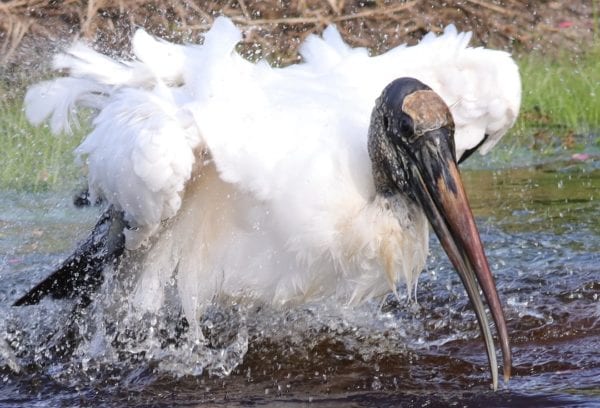Achieving a major conservation milestone following decades of conservation and large-scale restoration work, the Department of the Interior has announced that the U.S. Fish and Wildlife Service is proposing to remove the wood stork from the federal list of Endangered and Threatened Wildlife. Wood storks (Mycteria americana) are the only species of stork breeding in the United States.
The announcement comes as the Endangered Species Act (ESA) turns 50 years old in 2023. Throughout the year, the Department will celebrate the importance of the ESA in preventing the extinction of imperiled species, promoting the recovery of wildlife and conserving the habitats upon which they depend.
“The Endangered Species Act provides a critical safety net for fish, wildlife and plants and has prevented the extinction of hundreds of imperiled species, as well as promoted the recovery of many others, and conserved the habitats upon which they depend,” said Secretary Deb Haaland. “The proposed delisting of the wood stork is a significant milestone and a testament to the hard work by federal agencies, state and local governments, Tribes, conservation organizations, and private citizens in protecting and restoring our most at-risk species.”

The wood stork faced extinction when listed in 1984 under the Endangered Species Act. The population decreased from 20,000 nesting pairs to less than 5,000 pairs, primarily nesting in south Florida’s Everglades and Big Cypress ecosystems. Today, the wood stork breeding population has doubled to 10,000 or more nesting pairs and increased its range, including the coastal plains of Mississippi, Alabama, Florida, Georgia, South Carolina and North Carolina. These long-legged wading birds more than tripled their number of nesting colonies from 29 to 99 in their expanded range. They’ve adapted to new nesting areas, moving north into coastal salt marshes, old, flooded rice fields, floodplain forest wetlands, and human-created wetlands.
If the wood stork is delisted, the Migratory Bird Treaty Act, the Clean Water Act, and state environmental regulations will continue to protect this species and the wetland habitats it depends upon. The ESA requires the Service to implement a post-delisting monitoring plan for a minimum of five years to ensure the species remains stable.
In addition, this proposed delisting reinforces the importance of restoration programs in the Everglades and Big Cypress ecosystems (Comprehensive Everglades Restoration Plan) and other ecosystem restoration efforts throughout the Southeast. The CERP enacted by Congress in 2000 remains among the highest national conservation priorities for the Service. Delisting the wood stork would not change the Service’s focus on the Everglades restoration, as CERP will continue to focus on restoration that can support robust wood stork breeding within the Everglades and Big Cypress ecosystems.

